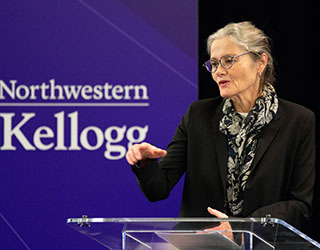Administrators talk fall return to campus in discussion with NU community

Interim Provost Kathleen Hagerty.
July 16, 2020
The University held its first in a series of online discussions related to Northwestern’s Phased Return to Campus plan Thursday, with administrators answering questions submitted by students, parents, faculty and staff.
The webinar was hosted by Kathleen Hagerty, the interim provost, and Luke Figora, senior associate vice president and chief risk and compliance officer, to create a dialogue among the community and “ensure our return to campus goes smoothly.”
The key tenet in NU’s planning efforts, Figora said, was to try to plan a safe in-person experience. Hagerty said a survey of students, faculty and staff indicated that though remote learning went better than expected, students thought it was not as engaging as in-person classes, noting that many students experienced problems with their learning environments.
If in the fall, the community gets to a point where the in-person learning environment doesn’t work or members don’t feel comfortable from a health and safety perspective, Figora said the University has options.
“We are better prepared today for a remote environment than we’ve ever been,” Figora said. “We don’t know where we’ll stand in a month-and-a-half from now, but we’re trying to get ourselves in the best position to be ready.”
The Kellogg School of Management will begin hosting a hybrid model of teaching next week, Hagerty said. She added that these can serve as “experiments” to see how the hybrid model will work.
There was also a discussion about the University’s COVID-19 case tracker, which was taken down at some point during Spring Quarter. Figora said since the campus was not highly populated in the spring, there was a concern that publishing the location of individuals on campus who contracted the virus would decrease their anonymity and violate their privacy.
Manuel Cuevas-Trisán, vice president for human resources and chief human resource officer, spoke on a new policy for faculty and staff that will allow “flexible” arrangements for the fall. The circumstances that the policy tries to cover include child care, elder care, lack of safe transportation options, concerns about exposure to family members and people with personal risk factors or underlying health conditions.
“There are factors here that are within our control, and yet there are others that are not entirely within our control,” Cuevas-Trisán said, “including government and community-based decisions.”
The underlying premise for this policy, Cuevas-Trisán said, is to enable work to continue and reconcile the need to protect the community with this new flexibility. He said the University is expecting managers and supervisors to accept that there will be inherent trade-offs because of this added flexibility, and to continue allowing remote work wherever possible.
The University has also created a special leave of absence for COVID-19-related situations, Cuevas-Trisán said.
Priya Harjani, associate vice president and deputy general counsel, said if an employee contracts COVID-19, the University has existing policies in place — such as accumulated sick time, extended sick time, accommodations from the Office of Equity and the Family and Medical Leave Act.
“The University has many different ways in which we’re trying to accommodate our faculty and staff,” she said. “This includes remote work where possible, accommodating people through alternative scheduling, different hours, different tasks — shifting all of these around and other creative solutions.”
Email: [email protected]
Twitter: @isabellesarraf
Related Stories:
— University provides updates on COVID-19 testing, contact tracing and safety provisions for Fall Quarter
— Registrar updates Fall Quarter scheduling timeline, modes of instruction and classroom capacities
— Students to return to campus for a modified Fall Quarter

